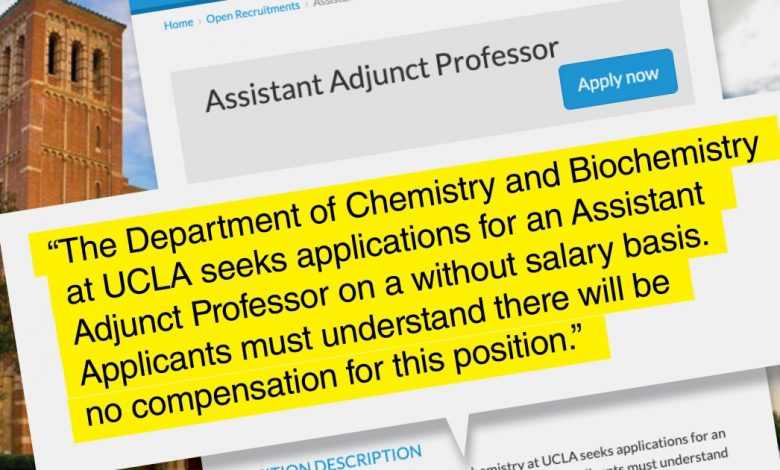What That Ad for the Unpaid Job at UCLA May Have Been About

A job posting at the University of California at Los Angeles drew harsh criticism from academics over the weekend for asking applicants to work on a “without salary basis.” Though the posting has since been taken down, speculation has persisted about whether its existence was the result of bureaucratic opacity, academe’s penchant for exploiting labor, or a little bit of both.
Posted on March 4, the listing — for an assistant adjunct professor in the department of chemistry and biochemistry — sought candidates with a Ph.D. and “significant experience and strong record in teaching.” But interested candidates, the posting read, “must understand there will be no compensation for this position.”
After an online backlash from scholars who called the position exploitative, the department on Saturday issued an apology on Twitter, citing “unfortunate wording,” and the listing was removed from UCLA’s website. (An archived version is available here.) The chair of the department, Neil K. Garg, referred The Chronicle to a spokesman.
In an email on Monday, a UCLA spokesman said that the institution recognized the language in the advertisement “could have benefited from additional context,” and that it was committed to “doing better in the future.”
Later in the day, UCLA issued a follow-up statement that went further: “A recent job posting by UCLA Chemistry & Biochemistry contained errors, and we are sorry. We always offer compensation for formal classroom teaching. We will do better in the future and have taken down the posting, which we will make sure is correctly written and reposted. Our positions are open to all applicants,” Bill Kisliuk, UCLA’s director of media relations, wrote in an email to The Chronicle.
Kisliuk also provided a statement on Saturday about how such positions typically work. “Some positions may be without salary when individuals are compensated by other sources and a formal affiliation with UCLA is necessary,” the statement read. “These positions are considered when an individual can realize other benefits from the appointment that advance their scholarship, such as the ability to apply for or maintain grants, mentor students, and participate in research that can benefit society. These arrangements are common in academia, and in cases where formal classroom teaching is a component, compensation for these services is provided commensurate to experience and with an eye to equity within the unit.”
Several academics speculated online that the listing was directed toward an internal candidate who already held a staff or administrative position at UCLA and whose contract for that post barred teaching duties. On Twitter, Mark Warschauer, a professor of education and informatics at the University of California at Irvine, suggested another possibility — that the person in the role would be paid through external grant funding the scholar brought in. Whatever the rationale, Warschauer wrote, “it is almost certainly more reflective of bureaucracy than of trying to get somebody to teach without getting paid.”
That sort of explanation is plausible, said Timothy R. Cain, an associate professor of higher education at the University of Georgia. But he thinks the listing, and the response it elicited, raises a larger question about “the way we are structuring academic labor and what we are valuing and what we’re not valuing,” he said. “Teaching in exchange for a line on a CV or an affiliation with an academic institution says something quite significant about how academic labor is compensated and how it’s thought of.”
The payless position was, at least, legal per the University of California system’s policy, which allows hiring for a series of adjunct positions, including assistant adjunct professor, to be done “with or without salary.”
UCLA’s job advertisement invited comparisons to a similar situation at Southern Illinois University at Carbondale in 2018, in which a dean sought help in recruiting alumni with terminal degrees to sign on for three-year terms with “zero-time (adjunct) status.” (At the time, a Carbondale spokeswoman referred to participants in the program as “volunteer adjuncts.”) Tulane University’s law school also drew complaints in 2019 about an advertisement for a “volunteer” adjunct position, and quickly moved to clarify that “well-established or retired” professionals — often alumni — volunteer to mentor students and teach practice-based classes.
Such arrangements, Cain said, could be more common in informal contexts, where institutions recruit outside professionals to teach a class without sharing a listing externally.






